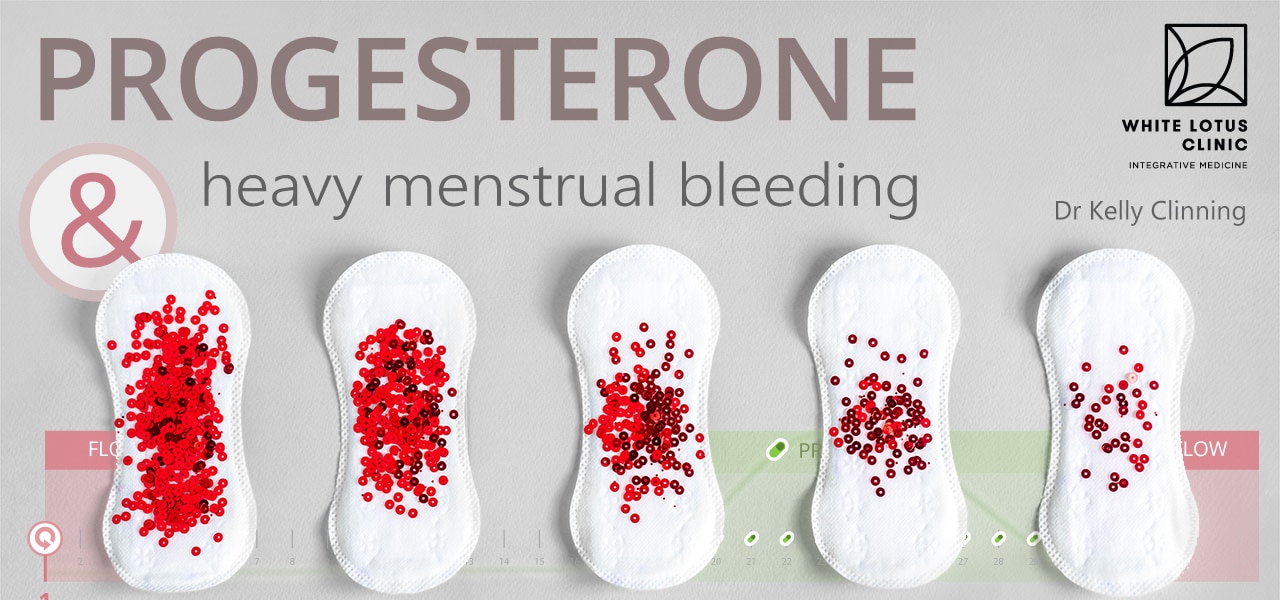Progesterone Therapy for Heavy Menstrual Bleeding
Many women experience very heavy menstrual cycles, frequently described as flooding. For them, the inability to reduce this heavy—and sometimes unpredictable—bleeding can be extremely stressful. Additionally, it can lead to dangerously low iron levels over time.
If your cycles are so heavy that you can’t go to work or leave the house, this is an issue that needs to and can be addressed! Progesterone therapy is one of the best and most effective treatment options. I frequently use cyclic progesterone therapy in our Toronto clinic to provide these women with some relief.

What is Considered Heavy Bleeding?
- Saturated light tampon = 3ml
- Saturated regular tampon = 5ml
- Saturated super tampon = 12 ml
- full menstrual cup = 20-32ml
(depending on the type used)
What Causes Heavy Bleeding?
- Perimenopause: This hormonal shift can occur up to 10 years before menopause. It’s associated with fluctuating estrogen and lowering progesterone levels. Other symptoms that can appear are hot flashes, vaginal dryness, migraines, and low libido.
- PCOS: A metabolic condition that can be associated with missing cycles or very long cycle. Symptoms include weight gain, hair loss, acne, and hirsutism. Some women with PCOS have high estrogen levels. Without monthly ovulation, they have lowered progesterone, which contributes to heavy cycles.
- Uterine fibroids
- Blood clotting disorders
- Infections
- Thyroid disease
- Endometrial polyps or endometrial cancer
Progesterone Therapy for Heavy Bleeding
Other Treatment Options
- Curcumin
- Ginger
- Dim/I3C (If estrogen excess is playing a role)
- Botanical astringents such as Sheppard’s Purse and Yarrow
- Oral contraceptive pills
- Hormonal IUD (Copper IUDs should be avoided since they can make cycles heavier!)
- Tranexamic Acid
- Ibuprofen
- Endometrial Ablation
- Hysterectomy
Get your iron checked!
On a final note, if you’re experiencing heavy menstrual bleeding, your iron stores must get assessed to monitor for anemia. It’s very common for women experiencing this monthly blood loss to have very low iron levels. This can make bleeding worse, as well as contribute to significant fatigue, shortness of breath, and in some cases worsening anxiety. I run a CBC and ferritin in all women experiencing heavy bleeding.
Next Steps
If you are experiencing heavy menstrual bleeding, you do not need to suffer. There are many conventional and naturopathic treatment options that can make a significant impact and improve your quality of life! Progesterone therapy is a proven and effective treatment option that can be discussed with your practitioner.
Dr. Jerilynn Prior has lots of information on using progesterone for heavy bleeding on her website here.
References
Bofill Rodriguez, M., Lethaby, A., & Farquhar, C. (2019). Non-steroidal anti-inflammatory drugs for heavy menstrual bleeding. Cochrane Database Of Systematic Reviews. doi: 10.1002/14651858.cd000400.pub4
Kashefi, F., Khajehei, M., Alavinia, M., Golmakani, E., & Asili, J. (2014). Effect of Ginger (Zingiber officinale) on Heavy Menstrual Bleeding: A Placebo-Controlled, Randomized Clinical Trial. Phytotherapy Research, 29(1), 114-119. doi: 10.1002/ptr.5235
Prior, J. (2015). Perimenopause and menopause as oestrogen deficiency while ignoring progesterone. Nature Reviews Disease Primers, 1(1). doi: 10.1038/nrdp.2015.31




